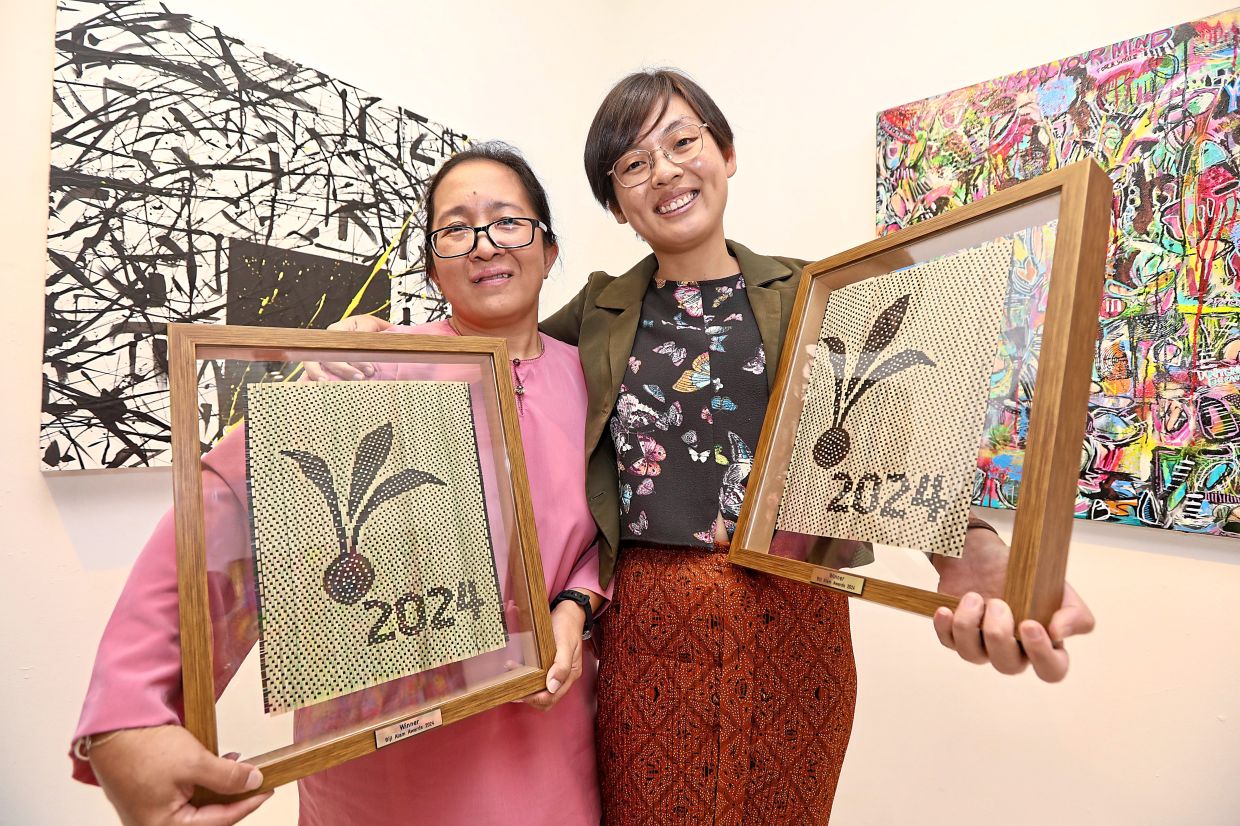Chong (left) and Yap at the Biji Alam Awards ceremony. Photo: The Star/Low Lay Phon
Urbanisation has become a threat faced by wildlife, according to local primate conservation groups. Wild animals such as monkeys and pangolins are losing their homes due to deforestation and pollution, undertaken for housing development in the country.
“Because of this, animals are exposed to other issues like unwanted human interaction,” says wildlife researcher and founder of the Langur Project Penang (LPP) Dr Yap Jo Leen.
“Many residents tend to assume that increased contact between humans and wildlife can lead to the spread of diseases and competition for space and resources,” Yap adds.
Co-founder of Save Our Pangolins (SOP) Dr Chong Ju Lian agrees, adding that the public has a lack of empathy and concern towards wildlife.
“There is less awareness when it comes to wild animals and the threats they face and most people prefer to stay silent because they assume it does not affect them,” she says.
“The absence of awareness from the public and authorities in addressing these threats is why these animal are endangered in the country,” she adds.
Important contributions
A conservation group that focuses on Sunda pangolins, SOP raises awareness of these animals by conducting educational talks, exhibitions and research across the country.
Apart from working with organisations such as the Department of Wildlife and National Parks (Perhilitan) and Universiti Malaysia Terengganu (UMT), SOP also runs a public outreach initiative called Sunda Pangolin Outreach Tour (Spot).
Since 2008, Chong has used her books and research findings on pangolins to set up conservation efforts since these animals are endangered due to deforestation and poaching.
Her 2019 research on the impact of pangolin farming found that these scaly mammals were poached for meat and traditional medicine. Published in Science Direct, the study states that “despite legislative restrictions, the illegal trade of pangolins indicate the animal’s exploitation for domestic and sometimes foreign usage.”
Chong’s research, knowledge and advocacy has also helped in policy changes, such as the ban on the commercial trade of pangolins in the Convention on International Trade in Endangered Species (CITES) Appendix I.
This has significantly reduced the demand in pangolin trafficking from Malaysia where these animals are heavily poached.
Aimed at primate conservation, LPP is a community- and science-based outreach and conservation project. Yap says she founded LPP as a postgraduate research project due to her passion for Malaysian wildlife.
The organisation has built an artificial road canopy bridge in Teluk Bahang, Penang to promote coexistence among humans and animals and lower roadkill rates.
This initiative was created after the group recorded seven road accidents involving primates such as the Dusky Langur and the Sunda slow loris.
Since its construction, LPP has recorded more than 5,000 new crossing events on the canopy’s camera traps.
One of LPP’s other initiatives is the Outreach Rainforest Programme, an environmental education initiative where participants learn about the importance of rainforests and its ecosystem.
For their efforts, Yap and Chong received the inaugural Biji Alam Awards organised by Biji Alam Conservation Society recently. The non-profit organisation was established to support the contributions of conservationists across Malaysia.
Public action necessary
A 2018 study published in Springer Nature on wild animals living within urban and suburban residences in Malaysia found that homeowners who engage in nature by going fishing, camping and hiking were more open to the coexistence between humans and animals.
“Efforts – such as conservation programmes, environmental education and public communication – should be carried out to enhance people’s acceptance of wild animals living within these areas in Malaysia,” it says.
Although social media has raised awareness about wildlife coexistence in housing areas, Yap encourages individuals to further educate themselves about these issues by volunteering in local conservation projects.
“Talking about the importance of wildlife and the threats they face is good but volunteering with conservation projects is a better, hands-on way to contribute to the cause,” she says.
Yap states that volunteerism is highly dependent on the public as they must take the initiative to tackle the threats faced by Malaysian wildlife.
“An effective way for folks to get involved is by integrating their hobby and passion into wildlife conservation efforts,” Yap says.
Chong suggests that everyone starts small, and some steps they can take include participating in cleaning activities in their neighbourhoods.
“Clearing the garbage around their community’s playgrounds and parks is a great start,” she says.
Ultimately, both of them agree that being curious and passionate about the environment will help the public make a tangible difference.
“Keeping an open mind in understanding environmental issues better is a great way to protect the safety of both humans and wild animals,” Yap says.
“Staying observant and addressing the issues that affect urban wildlife will lead to a healthy space for all,” Chong concludes.





